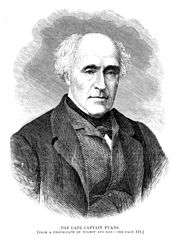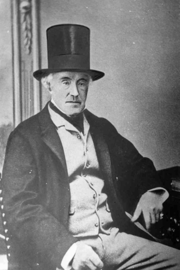Foster Fyans
Foster Fyans (1790–1870), soldier, penal administrator and public servant, was acting commandant of the second convict settlement at Norfolk Island, the first police magistrate at Geelong, and commissioner of crown lands for the Portland Bay pastoral district in the Port Phillip District of New South Wales.

Fyans was baptised at Clontarf, Dublin and joined the British Army in 1810, seeing service in the Peninsula War. From 1817 he served in India.
In 1833 Fyans joined the 4th Regiment of Foot at Sydney, New South Wales, and was posted to Norfolk Island as captain of the guard. In January 1834 an abortive mutiny led by John Knatchbull resulted in nine deaths and many wounded, and led to the recall of the commandant, James Morisset. As the next senior officer, Fyans acted until the new commandant arrived. He treated the mutineers harshly, keeping them locked in jail for many months in irons, and inflicting mass floggings. He regarded the convict settlement there as “a disgrace to England” and tried to replace slackness by strict control. He later became commandant at the Moreton Bay convict settlement.
He sold his commission in 1837, sailed for the fledgling town of Melbourne in the Port Phillip District (later the colony of Victoria), and took up the post of police magistrate at Geelong after the settlers there had asked the government for protection. He established himself on the Moorabool River at the site of present-day Fyansford, and set about the task of siting the town of Geelong. This involved building a breakwater in Corio Bay to provide a sheltered harbour that became the premier wool-exporting port of the colony. He also constructed a rock ford across the Barwon River in 1837, which gave name to the area now known as Breakwater, an eastern industrial and residential suburb of Geelong. The ford stopped the inflow of salt water to the fresh water river, thus supplying the town with fresh river water. The Fyansford Hotel is located nearby to the site of Fyan's first camp.
In 1839 Fyans was ordered to Portland to investigate claims of “interference with native women” by ex-convict shepherds employed by squatters (pastoralists) the Henty brothers, a revenge killing by Aboriginal people, and the subsequent shooting of a number of Aboriginal people, women as well as men, by a Henty raiding party. He found that the accusations against the Henty brothers were false, and they were appointed as magistrates in the district. (see Bassett, pp. 444–7).
In 1840 he was appointed as commissioner of crown lands for the Portland Bay district, an area half the size of England. His duties included making government returns for the licensed runs and their occupants, receiving their annual £10 licence fee, and maintaining law and order between the squatters and the Aborigines. Described by Kiddle as “a man of hasty temper and a high hand” his word was law in the district. He ran his own cattle station west of Lake Colac, later selling this and settling in Geelong in 1845.

In January 1843 Fyans married Elizabeth Alice Cane, and they had two daughters and a son. His wife died in March 1858, aged 42.
In 1849 he was reappointed police magistrate and was nominated as the inaugural mayor of the Geelong Town Council. Following the discovery of gold in Victoria he retired in 1853, and began to write his recollections. He died at his Geelong home ‘Balyang’ on 23 May 1870.
References
- Australian Dictionary of Biography, Vol I, pp. 422–424.
- Bassett, Marnie, The Hentys: An Australian colonial tapestry, London, OUP, 1954
- Hazzard, Margaret, ‘’Punishment Short of Death: a history of the penal settlement at Norfolk Island’’, Melbourne, Hyland, 1984. (ISBN 0-908090-64-1)
- Hughes, Robert, ‘’The Fatal Shore’’, London, Pan, 1988. (ISBN 0-330-29892-5)
- Kiddle, Margaret, ‘’’Men of Yesterday’’’, Melbourne, MUP, 1961.